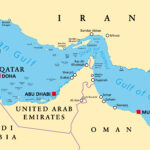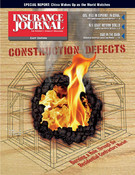This is the first in a series of articles on the Asia insurance marketplace. Part two in this series will focus on India and will appear in a September issue of Insurance Journal.
“Let China Sleep, for when she wakes, she will shake the world,” (Napoleon Bonaparte). The French Emperor’s warning, uttered some 200 years ago, rang hollow for most of that time, as China suffered through the wars, social upheavals and revolutions of the 20th century. The world’s oldest continuous civilization and most populous country, greater than the United States, Europe, Russia and Japan combined, seemed to be sinking ever deeper into chaos. However, as China modernizes and the economy expands, those words are sounding increasingly prescient.
The economy of the People’s Republic of China has awakened, and the consequences are being felt around the world. Toys, household appliances, tools, electronics, clothes and other manufactured goods are pouring from China’s factories in record numbers. China now consumes more oil than any other country, except the United States. Consumption jumped 30 percent last year. Around 30,000 new cars hit Beijing’s already crowded streets each month. China now consumes more coking coal and iron ore in making steel than any other country. Its ancient cities are being transformed into modern skyscraper carpeted tracts at breakneck speed. The pace of growth has inevitably created strains.
The Central Intelligence Agency’s (CIA) “Factbook” on China points out some of the many paradoxes it has engendered. “In 2003, with its 1.3 billion people, but a GDP of just $5,000 per capita, China stood as the second-largest economy in the world after the United States (measured on a purchasing power parity basis). Agriculture and industry have posted major gains, especially in coastal areas near Hong Kong and opposite Taiwan, where foreign investment has helped spur output of both domestic and export goods. The leadership, however, often has experienced—as a result of its hybrid system—the worst results of socialism (bureaucracy and lassitude) and of capitalism (windfall gains and growing income disparities).”
By other economic measures, such as GNP, China normally ranks sixth, but as its economic growth continues, an estimated 9.7 percent in the first quarter of 2004, it can only get larger. According to the latest Organisation for Economic Co-operation and Development (OECD) figures China overtook the United States last year as the biggest recipient of foreign direct investment, receiving $53 billion, compared to $40 billion for the U.S.
The insurance sector has grown steadily along with the economy. Gross assets reached a record high of 1.0359 trillion yuan ($126.3 billion) at the end of May 2004. Premiums totaled 338.04 billion yuan ($40.87 billion) in 2003, a 27.1 percent increase over 2002. Reports quoted Wu Xiaoping, vice-chairman of the China Insurance Regulatory Commission (CIRC), as indicating that the amount of disposal capital of the country’s fledging insurance sector stood at 952.4 billion yuan ($116.1 billion).
The world acknowledged China’s progress by admitting the country to the World Trade Organization (WTO) in December 2001, after a 15-year campaign. Along the way, all parties made some significant compromises, especially with the United States and the European Community on trade. As a prelude to its WTO admission China concluded a Permanent Normal Trade Relations (PNTR) pact with the United States in 2000. It was a step strongly supported by the insurance industry. When the House approved the measure, AIG’s Maurice R. “Hank” Greenberg commented that the vote “shows there is a bipartisan consensus in support of engagement with China. Republicans and Democrats alike recognize that the best way to promote positive change in China is to trade with China.”
He didn’t mention that AIG was already doing some substantial “trade” with China, but the EU trade negotiators did. AIG’s insistence on preserving its right to have wholly owned Chinese subsidiaries was one of the last hurdles to be overcome before China joined the WTO. Greenberg mounted a spirited defense, pointing out that AIG had been founded in China in 1919, and was the first company to return there in 1992 when no other company would. AIG won the right to establish two more branches (it had four), before it has to play by the normal rules, which require 50 percent ownership with a Chinese partner.
On joining the WTO, China made a number of additional commitments to further reduce barriers to entry in its insurance market and to allow foreign carriers greater latitude to operate there. Subsequent reports on that progress usually describe it as “mixed.” The Communist Party and its attendant bloated, and in many cases corrupt, bureaucracy still rules the country politically. In that respect, China remains a totalitarian state. But the economy is increasingly run by the private sector—at least the part that is most successful. It is this market that attracts the AIG’s, HSBC’s and Swiss Re’s, not the masses of poor people, 50 percent of whom—according to the CIA Factbook—make up the country’s agricultural labor force.
The rigid political system has caused other problems as well. China’s state-owned banks, forced to lend to inefficient state enterprises, have accumulated a mountain of bad debt, estimated to be at least $200 billion. Despite ongoing reform efforts, the Chinese legal system is generally seen as arbitrary, and heavily influenced by local politicians and businessmen. Ironically, China’s growth is putting ever-increasing strains on its infrastructure, especially in the critical energy sector with brownouts and even blackouts becoming more common. The government recently announced plans to slow down the economy in order to try and catch up.
None of this has kept the world’s insurers, brokers and service providers from seeking to invest in China, but it has made them more cautious. Under the umbrella organization, the U.S.-China Business Council (USCBC), representatives from a number of industries, insurance included, monitor China’s progress on implementing the commitments it made when it joined the WTO.
In its report “China’s WTO Implementation: A Mid-Year Assessment,” published in June 2003, the USCBC identified five specific commitments China had made to implement insurance sector reforms as follows:
• Permit wholly foreign-owned subsidiaries of foreign nonlife insurers.
• Reduce to 10 percent the mandatory cession to China Reinsurance Co. of all lines of primary risk for nonlife personal accident and health insurance business.
• Allow foreign life and nonlife insurers and insurance brokers to provide services in Beijing, Chengdu, Chongqing, Ningbo, Shenyang, Suzhou, Tianjin, Wuhan, and Xiamen.
• Permit foreign nonlife insurers to provide the full range of nonlife insurance services to both foreign and domestic clients.
• Reduce insurance brokers’ asset requirements to $300 million.
In October 2003, the organization presented a two-year progress report to a U.S. government committee. It “voiced concern over China’s apparent loss of momentum in fulfilling key commitments required of the country as conditions of its entry into the World Trade Organization (WTO),” including some of its commitments on insurance.
In February of this year, however, USCBC President Robert A. Kapp, in testimony before the U.S.-China Economic and Security Review Commission, stated: “The very end of 2003 saw movement by China on some of the outstanding issues of its WTO membership, and further movement is expected in early 2004.” In his review of the insurance sector, Kapp noted that “five new cities were opened to foreign nonlife insurance companies by Dec. 12, 2003. By the end of 2004, geographic restrictions on foreign insurers are scheduled to be eliminated. Serious disagreements, however, remain in the area of Chinese regulations regarding the corporate structures required for branching.” The CIRC applies the 1995 basic insurance law, which requires each branch to be independently capitalized “with a minimum of two hundred million yuan (RMB 200,000,000),” around $25 million.
For all of the problems and caveats, the world’s insurers and financial services companies continue to avidly pursue opportunities in China. Everyone’s afraid the train will leave the station, and they won’t be on board. Some of the more recent major initiatives have included the following:
• General Re is licensed to operate as a composite reinsurance company in China on a nationwide basis.
• Willis receives permission from the CIRC to complete the purchase of a 50 percent equity stake in Shanghai Pudong Insurance Brokers Ltd.
• Zurich’s Emerging Markets Solutions, the company’s political risk and trade credit insurance unit, signs a memorandum of understanding with the China Export & Credit Insurance Corporation, also known as Sinosure.
• France’s SCOR Group submits an application to the CIRC for a reinsurance license to “reinforce and develop its non-life reinsurance business activities in China.”
• Allianz Chairman and CEO Michael Diekmann on a visit to Shanghai stresses the German giant’s long-term commitments there, and states that the Group’s business in China “has already contributed 5 percent to Allianz Group’s gross written premiums in 2003.”
• Met Life gets CIRC approval for its 50/50 venture with the owner of the Beijing International Airport.
• HSBC announces it has a 24.9 percent stake in a joint venture with two Chinese investment companies to create Beijing HSBC Insurance Brokers Ltd.
• GAB Robins Group receives approval from the CIRC to become the first global loss-adjusting firm to provide services to the Chinese insurance industry.
• Swiss Re officially opens the company’s China branch office in Beijing.
• AIG makes an investment in PICC Property and Casualty Company Limited, China’s largest P/C insurer, acquiring a 9.9 percent stake. Shortly thereafter PICC raises $693 million in an initial public offering.
• Liberty Mutual receives approval to open an office in Chonquing, marking the company’s entry into the Chinese P/C market.
• Munich Re becomes the first international reinsurer to receive a countrywide composite reinsurance operating license from the CIRC.
Even before the PICC deal was announced AIG was the largest foreign insurer in China. With that transaction, it can now access a distribution network, which “serves approximately 70 percent of the country’s general insurance market with over 128,000 agents and sales representatives throughout China.” No wonder AIG is seen as the 800-pound gorilla of the Chinese foreign insurance market.
As China rushes headlong into the modern world, it has changed, and it will continue to change, but at its own pace, and for its own reasons. For the most part foreign companies are pursuing the West’s age-old dream of deriving huge profits from China.
The CIRC’s Web site, available in English at: www.chinaonline.com/refer/ministry_profiles/circl3.asp, presents the Chinese view of their usefulness. It “hopes that introducing foreign insurers gradually will bring in advanced technologies, sales techniques, and management know-how and give [Chinese] companies added impetus to hone their edge. The competitiveness of liability insurance for infrastructure construction, property and life insurance has been enhanced by China’s recent colossal infrastructure investment and housing and health care reforms.” That was written in 2000, but Chinese political officials haven’t significantly altered their views.
That may change in certain respects, as the regulators begin to realize, perhaps due to the expanding presence of the foreign companies, that the nature of China’s government is basically incompatible with a free market in insurance. China’s mixed economy, much of which is still state-owned, is at least partly to blame for what CIRC Chairman Wu Dingfu characterized as inefficiency and lack of credit. The official Xinhua news agency quoted him as saying that, “the insurance business neither met the needs of society nor played the role it should though it grew rapidly in recent years.” As an example, while private insurance coverage plays a major role in providing disaster relief in Western countries, the government still shoulders the bulk of responsibility in China.
He also described another concern in terms that Western companies can certainly appreciate, noting that the irrational pursuit of premium growth has led to such problems as inadequate reserves in insurance companies and increased business risk. Even China it seems is troubled by the cycle.
There is still great reluctance, however, to change the system. Since China began its market reforms, both the economy and the people as a whole have benefited, but the country’s leaders haven’t forgotten the years of humiliation imposed by foreign domination. Political control is still rigidly enforced, even as economic control is being loosened. For the moment it works, as life has gotten a good deal better for a large number of Chinese, especially the business community.
China has always proved adept at adopting useful techniques and innovations from what used to be called “the barbarians.” The country’s entrepreneurs, who are now free to make deals, then offer those products faster and cheaper. But for all its growing strength, China’s modernization is still fragile; therefore the leaders make changes only slowly. If this is seen in the West as foot dragging, or “pushback,” those leaders see it as the only possible way to proceed.
Wei-Wei Zhang, a senior research fellow at the Modern Asia research Center in Geneva, recently commented in an editorial in the International Herald Tribune that “China is now the largest laboratory of economic, social and political change in human history.” He saw an emerging consensus emanating from China’s new leaders, President Hu Jingtao and Prime Minister Wen Jiabao, “that there should be a more substantial political reform to limit the power of the bureaucracy, promote the rule of law and make the state more transparent and accountable to the people.” Eventually this would result in more democracy and more rights for individuals. He warned, however that “a strong state is likely to be maintained … to ensure overall political stability.”
China will continue to modernize, if for no other reason than it has to, and the insurance industry will continue to derive a good deal of benefit from it. After all, those new drivers, new buildings and the expanding middle class need to be insured, and China doesn’t have sufficient capital at present to underwrite the burgeoning risks.
Wei-Wei Zhang concluded that the transformation of the Chinese State is inevitable, “but it is likely to be gradual, pragmatic and accumulative, in much the same way as China’s economic reforms unfolded.” Whatever else may happen in China, as rock and roll legend Jerry Lee Lewis once sang, there’s a “Whole Lotta Shakin’ Goin’ On.”
Topics USA Carriers Agencies Europe Agribusiness Reinsurance China Property Casualty Market AIG
Was this article valuable?
Here are more articles you may enjoy.


 Cuts to Funding Mean Risks Will Pivot in Human Services Market
Cuts to Funding Mean Risks Will Pivot in Human Services Market  AI Lost Out to Traditional Models in Forecasting NYC’s Blizzard
AI Lost Out to Traditional Models in Forecasting NYC’s Blizzard  Marine Insurers Cancel War Risk Cover as Iran Conflict Escalates
Marine Insurers Cancel War Risk Cover as Iran Conflict Escalates  Premium Slowdown, Inflation Factors to Lead to Higher P/C Combined Ratio: AM Best
Premium Slowdown, Inflation Factors to Lead to Higher P/C Combined Ratio: AM Best 


